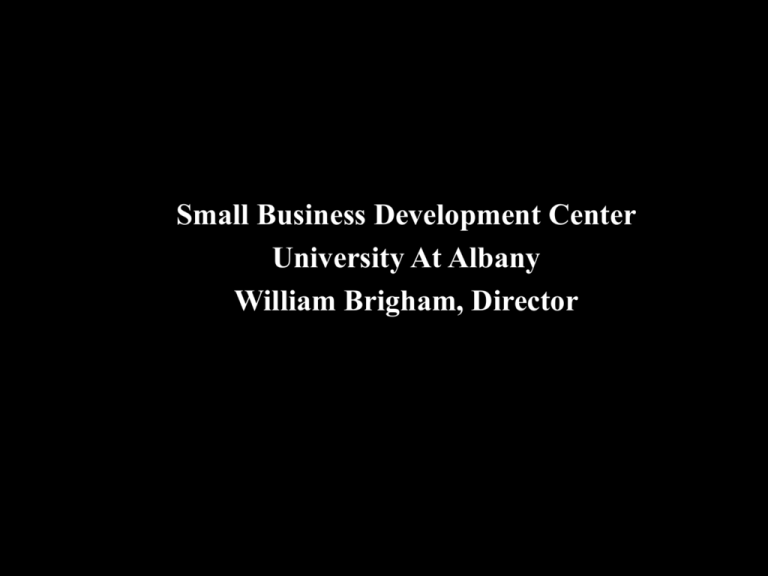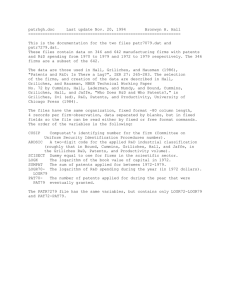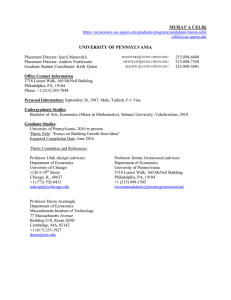entrepreneurship
advertisement

Small Business Development Center University At Albany William Brigham, Director Creating stronger businesses and a more viable economy for all New Yorkers… So, what is an entrepreneur? Webster’s dictionary describes it as one who organizes, manages, and assumes the risks of a business. Why is business changing? During the past 100 years small, efficient, and manageable companies have become large unmanageable bureaucratic organizations. Combine bureaucratic practices, with global competition from countries where labor costs were lower, work ethic remained, and hungry entrepreneurs sensed opportunity. The corporate crash was inevitable. Industries are evolving and transforming at a puzzling pace. It took radio 38 years to reach 50 million listeners. It took television 13 years to reach 50 million viewers. It took the Internet only 5 years to reach 50 million users. Steve Jobs of Apple Computer toured Xerox in the late 70s and was introduced to graphical user interface. Xerox did not recognize the potential and Jobs did. Today, most PCs operate with an interface descending from this innovation. Computer technologies were first pioneered by IBM with patents, scientists, and the R&D to go to market, but the minicomputer market was created by entrepreneurs at Digital and the computer work station at Sun Microsystems. IBM had the lead in technology, but not the entrepreneurial mindset. Innovation does not only involve technology. It can represent unique distribution strategies like Sears and Roebuck and Amazon.com, pricing strategies like Home Depot and Charles Schwab, or convenience like McDonalds and Starbucks. Think of new industries that did not exist a generation ago; personal computing, voice mail, cellular phones, fast oil changes, internet shopping, convenience foods, super stores, and digital entertainment. Since 1980, the United States has added more than 34 million new jobs, while Fortune 500 companies lost more than 5 million jobs. In the United States about 600,000 to 800,000 new businesses are started each year. So where is our future in the new millennium? Is it nanotechnology? But, the practical applications of nano technology to manufacture consumer goods may be one to two decades away. Today, consumer goods are made by pushing piles of atoms together in a bulky, imprecise manner. Nanotechnology could manipulate each individual atom of an object creating products that are cleaner, stronger, lighter, and more precise. How can students prepare for careers in Nanotechnology? Nanotechnology is fundamentally a branch of engineering. To work as an engineer, one must learn to think as an engineer, which means studying the principles of system engineering. Eventually, we will be able to replicate anything including diamonds, water, and food. Famine could be eliminated through fabrication of food. Great business ideas are all around us. Opening your eyes to trends that will effect the future business environment. How do we recognize these trends? Look at things around that bug you. What do you not have that you need? Gillette was fed up with sharpening his straight edge razor, so the disposable razor industry was born. Surfers in California were frustrated in the 70’s with the weather and small waves. Sidewalk surfing was born. An office secretary who took pride in her work invented “white out” using a kitchen blender. Artists paint over mistakes why couldn’t typists? A quick trend spotting technique is to stroll to your local magazine rack. Look at the thickness and number of publications and the ones that have thinned from lose of advertisers. What about the Internet? A recent Internet usage survey shows 72% of Americans have gone online at least once during a 30-day period. What about e-Bay? The overwhelming success of one segment creates opportunities for related or aftermarket services and products. Pay Pal, an on-line payment service, was launched in October of 1999. July 2002, eBay purchased Pay Pal for 1.5 billion dollars. The recent high volume real estate trade offers incredible opportunity. The demand for home inspectors radon mediators, floor finishers, and electrical contactors grows proportionately. Management consultants continue to be high in demand due to changing technology and a trend toward outsourcing of services. E-learning and training is growing, since technology has improved the ability to deliver quality content to office workstations instead of the need to go off-site. In twenty years baby boomers are not going to opt for expensive long-term hospital care. The home care industry will not be able to serve the surge in demand, so house bound senior check-in services and home meal replacement for those with dietary restrictions will flourish. Do you see the pattern? Trends are nearly impossible to predict, but small businesses do not need to be trendsetters, but you can capitalize on following trends. There is usually a piece of business for everyone. Peter Drucker – “Entrepreneurial Revolution” How important are small businesses to the U.S. economy? Small firms… • Represent 99.7 percent of all employer firms. • Employ half of all private sector employees. • Pay 45 percent of total U.S. private payroll. • Have generated 60 to 80 percent of net new jobs annually over the last decade. •How important are small businesses to the U.S. economy? Small firms… •Produce 13 to 14 times more patents per employee than large patenting firms. These patents are twice as likely as large firm patents to be among the one percent most cited • Are employers of 41 percent of high tech workers (such as scientists, engineers, and computer workers). How important are small businesses to the U.S. economy? Small firms… • Represent 99.7 percent of all employer firms. • Employ half of all private sector employees. • Pay 45 percent of total U.S. private payroll. • Have generated 60 to 80 percent of net new jobs annually over the last decade. • Produce 13 to 14 times more patents per employee than large patenting firms. These patents are twice as likely as large firm patents to be among the one percent most cited. • Are employers of 41 percent of high tech workers (such as scientists, engineers, and computer workers). How Important is the Internet to Small Business? •According to eMarketer, online shoppers today closely resemble the US population as a whole •U.S online retail sales will almost double from $172 billion in 2005 to $329 billion in 2010 according to Forrester Research •Last year, online sales were $114.1B, an increase of 51% from the previous year. This year, online sales are expected to increase 27% to $144B1 •20% of people say checking e-mails first thing in the morning delayed them taking kids to school on time. 26% said they made it to work late and 15% stated they checked e-mails via PDA the bathroom3 •Source: Reachon.com, 2005How Fastest Growing Online Products According to data from comScore Networks, What were the fastest growing product categories online for 2005. Apparel and Accessories (+36%) Computer Software (+36%) Home and Garden (+32%) Toys and Hobbies (+32%) Jewelry and Watches (+27%) Event Tickets (+26%) Furniture (+24%) Flowers, Greetings & Gifts (+23%)











